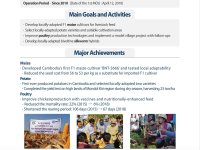Case Study
Cross-KIC Circular Economy in the Western Balkans: Systems and stakeholders mapping for policy…
Better ecosystem understanding is needed in the Western Balkans where governments face the challenge of aligning with the European Green Deal and Circular Economy amid EU enlargement discussions. This project implements an innovation policy for sustainable growth by introducing tools for territorial analysis to support development policies. It is the first regional effort of this kind, positioning existing circular economy challenge owners in a system viewpoint as part of a co-creation process.




